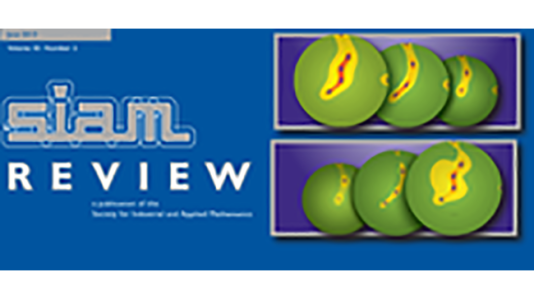
Stefan Wild, an assistant computational mathematician in Argonne’s Mathematics and Computer Science Division, and his colleague Christine Shoemaker, Ripley Professor at Cornell University, have won the SIAM SIGEST award for their paper “Global Convergence of Radial Basis Function Trust Region Derivative-Free Algorithms.” The award will be conferred at the SIAM annual meeting in Chicago in July.
According to C. T. Kelley, editor-in-chief of SIAM Review, “SIGEST highlights a recent paper from one of SIAM’s specialized research journals, chosen on the basis of exceptional interest to the entire SIAM community.” Wild and Shoemaker’s paper appeared in the SIAM Journal on Optimization (SIOPT) in 2011.
“We were surprised to receive this award because SIGEST chooses a paper from SIOPT only every two to three years,” said Wild. Images adapted from the article were also selected for the cover of SIAM Review.
The winning paper focuses on problems in which the derivatives of the objective function are not available. “Model-based methods” for such problems coarsely approximate (interpolate) the function, attempting to minimize the number of evaluation points.
“The computational expense of the function evaluation is a bottleneck for classical techniques in many applications of interest to the Department of Energy requiring several hours on a large cluster,” said Wild.
The researchers used ORBIT, a trust region algorithm they previously had developed that relies on radial basis functions (RBFs) for the interpolation. They showed how different radial functions can fit into a globally convergent framework.
Wild and Shoemaker demonstrated their new method on a subsurface contamination problem at the Blaine Naval Ammunition Depot in Nebraska. In this problem the goal is to devise a design strategy to minimize the costs of injecting clean water or extracting and treating contaminated water at various wells on the site. The problem involved three CPU-days for a single run of 80 evaluations (i.e., environmental model simulations).
The Blaine application did highlight the fact that computational noise – in part caused by truncation errors in the discretizations – can hinder globally convergent local methods from finding good solutions. The researchers therefore plan to focus next on “large-step” variants of ORBIT designed to step over such computational noise.
The full article is available at http://epubs.siam.org/doi/pdf/10.1137/09074927X. For a one-page writeup on the award, see the SIAM website http://epubs.siam.org/doi/abs/10.1137/130973399.